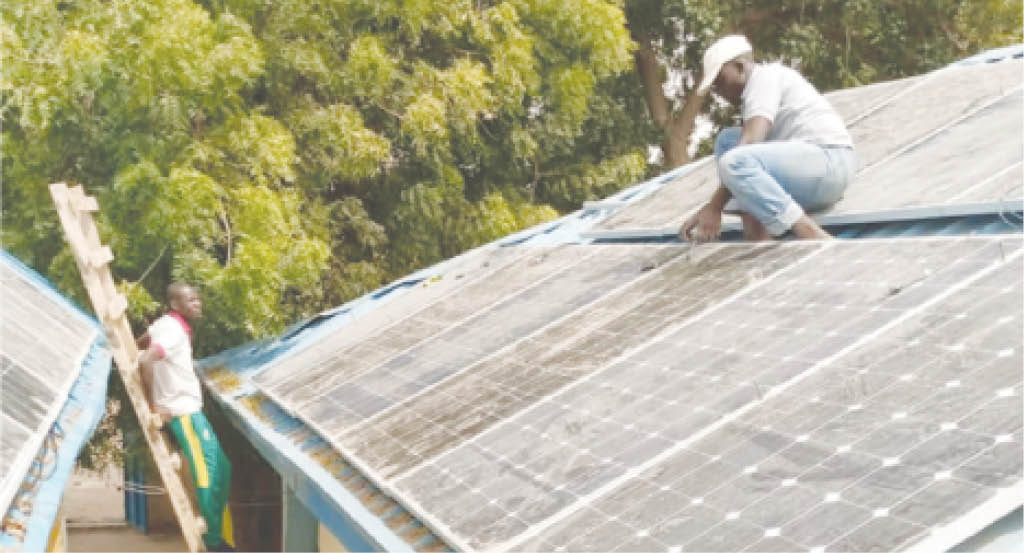Insurgency was said to have reportedly disrupted the development of social and economic fabrics of the Borno State, wherein electric power infrastructure which comprised of generation, transmission and distribution systems were damaged which leaved millions in darkness and dysfunctional public services.
The General Hospital, Bama, for example, which was rehabilitated by the state government and reopened after the return of normalcy had to rely on generators to supply its building’s power needs a medical officers has said.
- 5 years after: Zulum orders rehabilitation of GGSS Chibok
- Boko Haram: Zulum unveils 25-year development plan for Borno
But staffers and patients heaved a sigh of relief three weeks ago after the installation of solar Photovoltaic (PV) devices which supplied usable power to the hospital, the officer said.
The solar systems were under the EU Support to Response, Recovery and Resilience in Borno State (MAIDA) implemented by the International Center for Energy and Environment Development (ICEED) and Mercy Corps across the state.
“Diesel generator was used to provide power in the hospital due to interruptions from the grid and that costs a lot of money. But with installation of the solar systems, three week ago, the lab, theatre and OPD have got steady energy supply,” he said.
Executive Director, ICEED, Ewah Eleri said the project actually provided solar PV systems for 12 health and education facilities in target areas of the state. Each institution was provided with a ‘robust’ 5KVA solar PV system that operated even beyond dusk, he explained.
“Already, there are success stories from some of the health institutions. For example, at the Bama Clinic, the solar systems have facilitated the introduction of health equipment that were never in use due to epileptic power supply. The number of patients that the hospital attends to, has also increased because of the consistent power. The freezers for storing vaccines are now working optimally,” he said.
He said, in General Hospital, Bama, the solar system helped in the powering of the hospital’s emergency unit, the theatre and the administrative block while at the Kaleri Maternal and Child Center, Mafa, the solar system helped in service expansion and improvement.
“Earlier, the Mafa Center reportedly had been bogged down by exorbitant accumulated power bills, which left the place to operate without energy supply,” Eleri stated.
MAIDA project was designed to support the recovery of up to 200,000 men, women, adolescent boys and girls who are returnees, IDPs and host community members affected by the insurgency in the state. The goal of the project was to increase social cohesion, recovery and resilience to economic, social and climate related shocks for conflict affected communities in Biu, Hawul, Kwaya Kusar, Mafa, Jere, Bama and Gwoza local government and areas. The project aligned directly with the global objective of the EU’s planned support for early recovery in Borno State, aiming to strengthen resilience in communities affected by the insurgency.
The project had further offered solar energy installation and entrepreneurial skills to dozens of beneficiaries.
Kaumi Shettima, said he received renewable energy education including skills on installation and management of solar systems from ICEED alongside 19 trainees from various local government in the state.
Shettima, from Mafa, said there was gradual increase in solar energy boom in the insurgency-ravaged areas of the state and that off-grid energy solution provided affordable electricity to communities.
According to him, apart from renewable energy skills, trainees were given tools and linked with entrepreneurs to work and earn a living.
He said, “I and two other colleagues worked with an energy company two weeks ago to install solar panels in 320 houses in Gwoza. I received N200,000 as payment in the end.”
A total of 20 girls and women were trained on solar installation, under the arrangement, he said.
Executive Ditector, ICEED, Eleri, said the project built the technical and business capacities of 140 youths in solar systems design, installation, maintenance, sales and after-sales services in addition to packs and facilitated the provision of conditional cash grants to the trainees.
He said, “Beyond providing the grants, continuous mentorship support as well as linkages to apprenticeship programmes, trainees were encouraged to form solar cooperatives and were assisted to get registered with the State Government to be able to legally do business. Some of the trained artisans have been able to improve their incomes by applying their new skills.
“A contract for the installation of solar PV systems in 650 households in Bama and Gwoza was awarded. The contractor was referred to the trainees as capable hands, and some of the trainees were hired by him to execute the job and were paid. Their involvement has contributed in enhancing their skills and visibility.”
Under the project, women learned how to built fuel-saving clay stoves and were encouraged to form cooperatives.
Kaltume Kime in Biu, said she was among the beneficiaries who were trained on cookstove making using clay and sawdust. She said trainees were waiting for the trainers to install an oven for heating the newly made stoves.
She said the stoves were more economical to use because the amount of firewood or charcoal needed to complete cooking could be reduced by cooking with retained heat.
Mr Eleri said project akso built the technical and business capacity of 140 male and female youths in efficient stoves production and sales and provided startup packs and facilitated the provision of conditional cash grants to the trainees.
He said, “The trainees were encouraged to form stove cooperatives and were assisted to get registered with the State Government to be able to legally do business. The cooperative associations have been in serious stove sales business running into millions of Naira. “They have been variously engaged by other national and international organisations to produce stoves. At the individual level, many of them have had their incomes diversified. For example one Haja Kaka Bura, a female member of the Gongulong Energy Efficient Cooperative Society, has used her part of her earnings from the stove production to establish businesses for two of her children.”

 Join Daily Trust WhatsApp Community For Quick Access To News and Happenings Around You.
Join Daily Trust WhatsApp Community For Quick Access To News and Happenings Around You.


